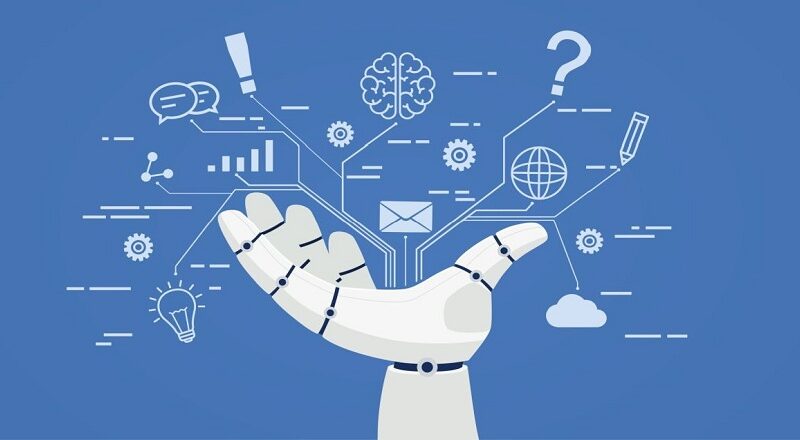The Transformative Duo: AI and Automation Reshaping Industries
The dynamic landscape of technology sees the convergence of (artificial intelligence) AI and automation as transformative forces. This article delves into their collaborative impact on various industries, exploring how they redefine operational processes and user interactions.
The Intersection of AI and Automation
AI, simulating human intelligence in machines, integrates seamlessly with automation, streamlining processes with minimal human intervention. This section outlines the symbiotic relationship between these technologies.
Expanding the Intersection
As converge, their symbiosis expands, fostering not only efficiency but also sparking innovation. The intersection creates fertile ground where intelligent machines and automated processes together become catalysts for industry evolution.
Enhancing Efficiency and Accuracy
Artificial intelligence and automation revolutionize task execution, ensuring unprecedented accuracy and speed. By delegating repetitive tasks to machines, human resources are liberated for higher-value activities requiring creativity and critical thinking.
Precision in Action
The precision introduced by AI isn’t confined to tasks; it extends to decision-making. Machines with cognitive capabilities enhance decision precision, providing businesses with insights that were once beyond reach.
Personalizing Customer Experiences
Revolution in Customer Interaction
The amalgamation of AI and automation transforms customer experiences through personalized recommendations. Algorithms analyze user behaviour, enhancing satisfaction and fostering loyalty across industries.
Human Touch in Automation
While algorithms drive personalization, the human touch remains essential. AI, when complemented by human insights, ensures that personalized customer interactions go beyond algorithms, creating meaningful and authentic connections.
Revolutionizing Manufacturing and Supply Chain
AI in Industry Transformation
Industries like manufacturing and supply chains witness radical changes through this technology. Predictive maintenance, logistics optimisation, and efficient resource allocation redefine operational efficiency.
Sustainable Transformation
The impact on manufacturing and supply chains isn’t just about efficiency; it’s also about sustainability. AI-driven automation optimizes resource use, contributing to eco-friendly practices and aligning industries with global environmental goals.
Healthcare Advancements
AI’s Impact on Healthcare
AI-powered diagnostics reshape healthcare, offering early disease detection and advancements in precision medicine. Machine learning algorithms analyze medical images, providing valuable insights.
Empowering Healthcare Professionals
In addition to diagnostics, AI supports healthcare professionals by streamlining administrative tasks. This allows medical practitioners to focus more on patient care, ultimately enhancing the overall healthcare experience.
AI Automation in Business Processes
Understanding AI Automation
This section defines it, differentiating it from traditional automation. It explores its applied use cases across industries and highlights its role in complementing human productivity.
Augmenting Human Capabilities
AI automation is not about replacing human roles but augmenting capabilities. Businesses embracing this technology empower their workforce to engage in more strategic, creative, and complex aspects of their roles.
Benefits of AI Automation in Business
Unlocking Business Potential
AI automation offers enhanced productivity, superior customer experiences, informed decision-making, and significant cost savings. This section elaborates on how businesses can leverage these advantages.
- Adapting to Market Dynamics
The benefits of AI automation extend beyond the immediate gains. Businesses leveraging these technologies demonstrate adaptability to market dynamics, positioning themselves as agile players ready to navigate evolving industry landscapes.
Challenges of Embracing AI Automation
While the benefits are vast, challenges such as data privacy concerns, labour market impacts, and transparency issues need careful consideration. This section explores the potential hurdles in adopting this technology.
Strategic Implementation
Addressing challenges requires strategic implementation. Companies must develop comprehensive strategies that prioritize ethical considerations, invest in workforce development, and implement robust cybersecurity measures to navigate the evolving landscape successfully.
Conclusion
In conclusion, integrating AI and automation signifies a paradigm shift in industry dynamics. Businesses navigating this era of intelligent technology have the unprecedented opportunity to optimize processes, spur growth, and unleash human creativity. As AI evolves, it propels industries into an era of unparalleled progress, unlocking possibilities once deemed the realm of science fiction. The journey has just begun, promising a future where human ingenuity collaborates harmoniously with advanced technologies.





Pingback: iLimeComix: Revolutionizing the Digital Comic World with Creativity and Innovation - Future Business Boost